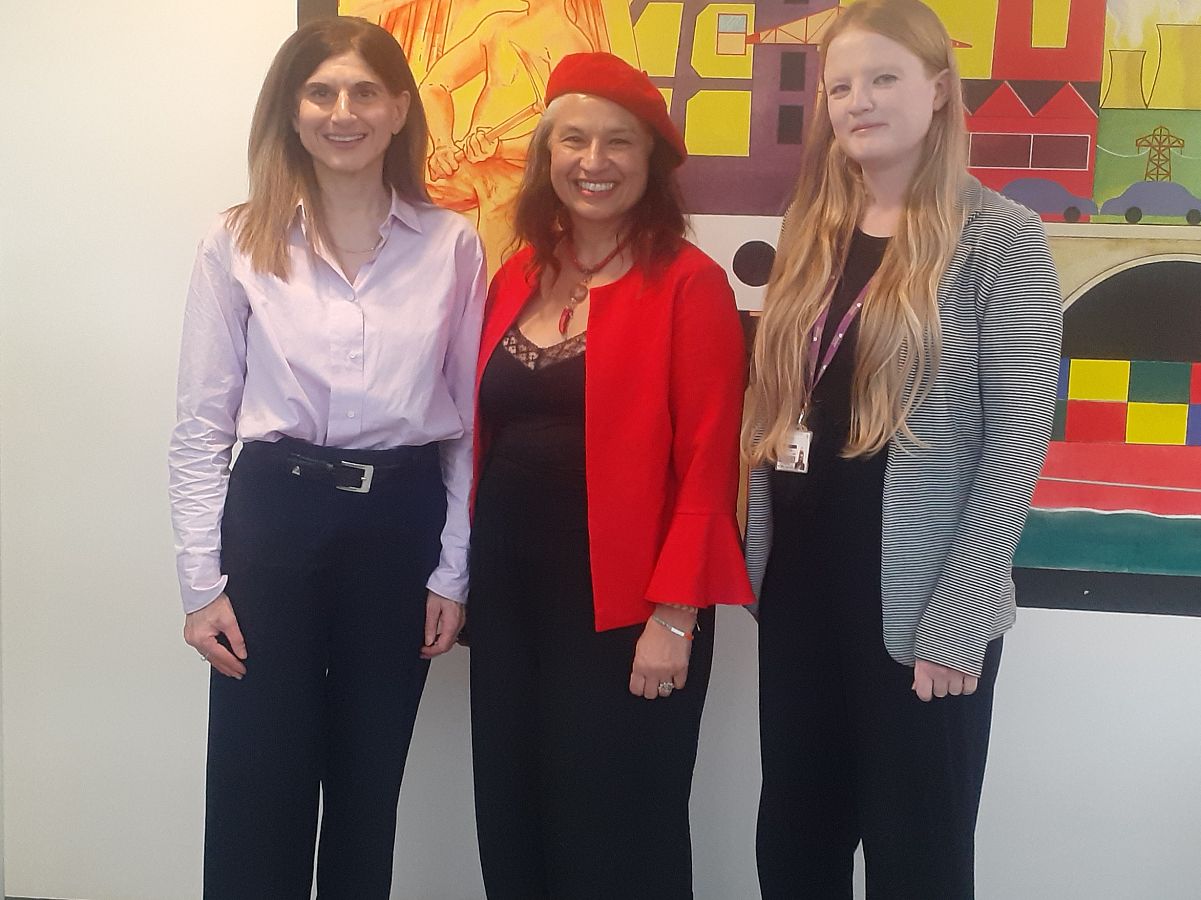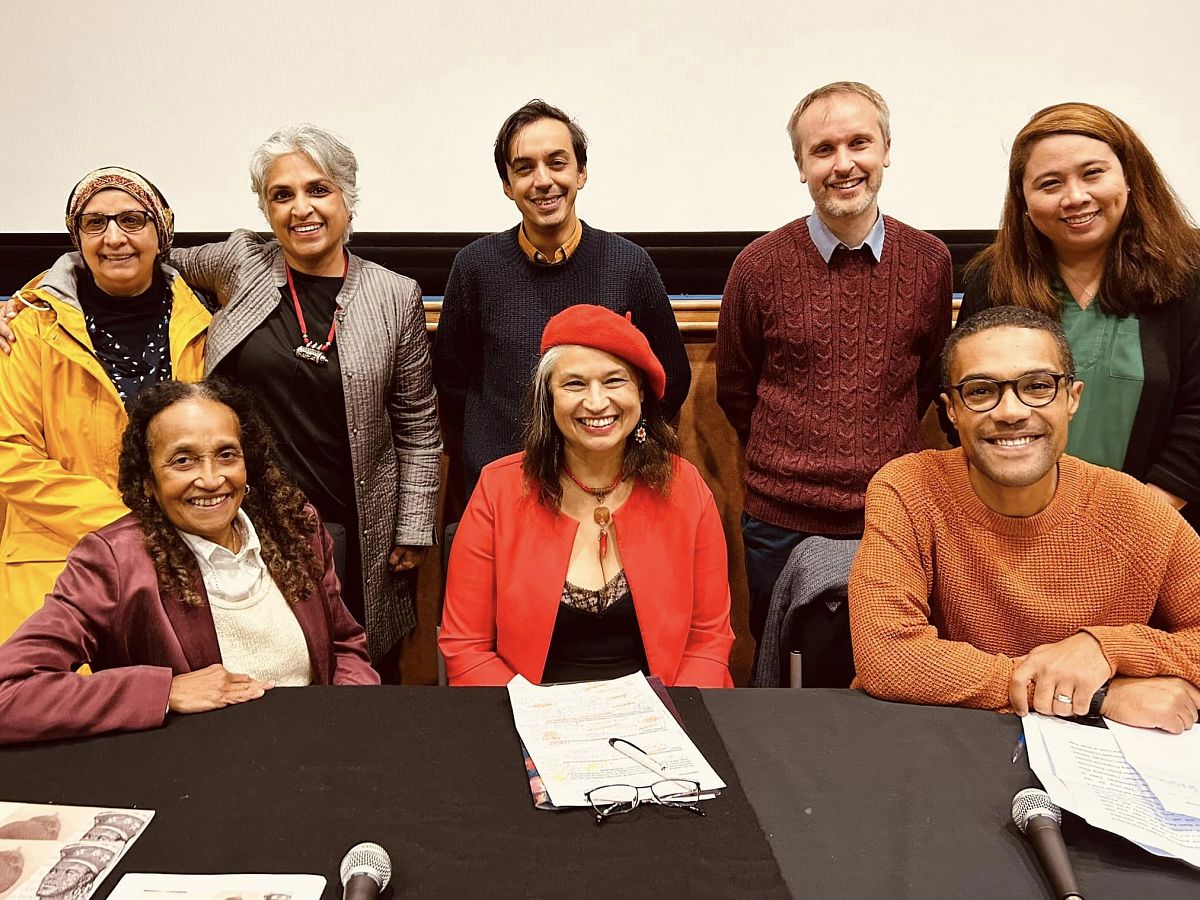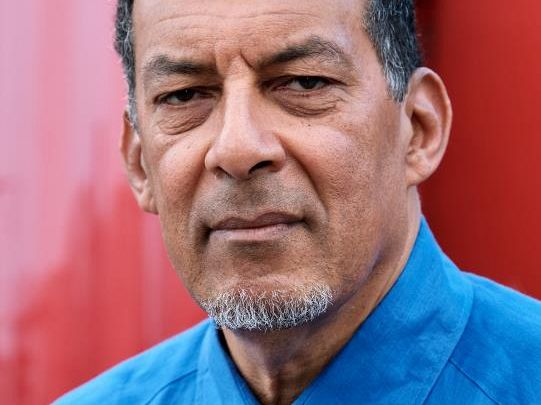Since 1987, Black History Month has sought to rectify the omission of many aspects of history relating to people of African and Caribbean heritage.
This year’s theme was ‘Time for Change: Action Not Words’, picking up on the commitments that were made to tackle racism in the wake of 2020’s Black Lives Matter protests. In the UK, those commitments included learning about the historical legacy of colonialism and slavery. However, this year’s Black History Month organisers suggest that real change requires meaningful, long-term actions.

L-r: Dr Laura Marsiliani, Prof Heidi Safia Mirza and Catherine Embleton
Events reflecting this theme took place throughout October across the University, including a series of film showings by the School of Modern Languages and Culture (MLAC), a lecture on the power of poetry from author Malik Al Nasir, and a range of speakers presented by the Chemistry Department's Decolonising and Diversifying the Curriculum Group.
The Equality, Diversity and Inclusion Unit, Durham People of Colour Association (DPOCA) and the Black, Asian and Minority Ethnic (BAME) Network welcomed Professor Hakim Adi as the month’s keynote speaker.

Seated (L-R): Dr Beverley Prevatt Goldstein, Prof Heidi Safia Mirza and Dr Liam Liburd (NB. Beverley and Heidi were the panel speakers, Liam was the panel chair) Standing (L-R): Dr Mahshid Turner, Prof Nayanika Mookherjee, Dr Jonathan Saha, Dr Jonathan Bush and Melanie Earnshaw
Professor of the History of Africa and the African Diaspora at the University of Chichester, Hakim Adi was the first historian of African heritage to become a professor of history in Britain.
Questioning the theme of this year’s Black History Month, Professor Adi’s talk – ‘History Matters’ – was a thought-provoking tour through moments from centuries of history in which words and action were shown to be equally important and inextricably linked.
Professor Adi spoke of the consequences of a distorted and incomplete history, pointing out how much it matters that we have a realistic sense of the world in which we live, and highlighting the value of lessons from history – the study of change.
Asked whether he thought Black History Month might one day become redundant, Professor Adi noted that the problem was not just changing a curriculum but also a society. He explained that, while the history of anti-racism shows that most people do not support racist acts, the history of the state and its institutions suggests major change is needed, and that that change will take some time. Strikingly, Professor Adi also noted that the term ‘Black History’ is itself problematic, indicating as it does a supposed distinction between black history and white. The thought that history is just history seems simple enough but could be the key to our society facing up to the realities of the past and the future.

Keynote speaker Professor Hakim Adi
Another BAME Network event was a talk from Dr Amra Bone on the voices of Muslim women chaplains in Higher Education, while a collaboration between the Network and History Now! brought together speakers from within higher education as well as historical researchers from outside academia to consider the present and future of black history in Britain.
The Business School welcomed UCL Emeritus Professor of Equality Studies in Education Heidi Safia Mirza, who explored how professional educators can engage in self-reflexive, anti-racist, courageous conversations, enabling them to begin the process of ‘decolonising’ established discourses of race, identity, and difference in the classroom. In 2018, Professor Mirza co-edited ‘Dismantling Race in Higher Education: Racism, Whiteness and Decolonising the Academy’ with Professor Jason Arday, founder of the pro:NE initiative.
Over at the Durham-BFI Film Club, Perry Henzell’s classic crime drama ‘The Harder They Come’ formed the basis for the Club’s Black History Month discussion. The film celebrates its 50th anniversary this year and host Dr Kenny Monrose (University of Cambridge) invited attendees to contribute their thoughts, questions and experiences while considering the movie’s key messages and impacts. Touching on the post-Windrush generation, music and film, and independence and identity, the conversation reflected on how the sights and sounds of the underbelly of Jamaican ghetto life presented in the film went on to transform British culture.
Students and staff can watch the film for free anytime using a BFI Player subscription.
Keynote speaker Hakim Adi highlighted the importance of maintaining the presence of black history year-round – not just in October. One ongoing event that will follow on from this month’s programme is a new exhibition, Digging Deep: Coal Miners of African Caribbean Heritage in the North East. Curator and founder of the Black Miners Museum Norma Gregory visited Ustinov College at the start of the month to talk about the exhibition, which features the stories of black miners and their contributions to the industry. The touring display, presented by Ustinov and University College in collaboration with the Equality, Diversity and Inclusion Unit (EDI) and the Department of Anthropology, will run until 30 November across three locations in Durham.
You can read more about Equality, Diversity and Inclusion (EDI) at Durham on our EDI webpages.
